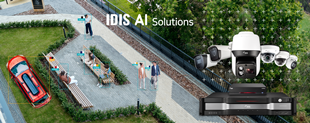Remote camera heads comprise an image sensor camera equipped with a fixed, pinhole or fisheye lens. As their name implies, they are designed to be installed remotely from the other components of a video surveillance camera and this means they can be discretely installed within an ATM and other tight spaces, or located neatly into a corner of a room or lift with the help of mounting brackets.
With Hanwha Techwin’s powerful Wisenet7 chipset at its heart, the PNM-9000QB camera module is able to simultaneously process images from the 4 remote head cameras. With less cable and network switches required, this makes the module far more cost-effective than its single channel predecessor, as the time system integrators have to spend on-site is reduced. With just a single IP connection, there is also a cost saving for end-users, as only one VMS licence is required.
Network security
When connected via specially designed cables and installed the other side of a wall to a module, the camera heads are totally isolated from the network. Although this is likely to be of benefit to most end-users, it will be of particular importance to banks who need to protect confidential customer data and prevent fraud.
Additional protection comes in the form of tamper detection which generates an alarm if someone covers, changes the angle or sprays paint on one of the head camera’s lens. The tamper detection feature is included in the module’s suite of intelligent video analytics (IVA), as is defocus detection, motion detection and loitering detection.
Effective images in low-light conditions
The Wisenet7 chipset at the heart of the PNM-9000QB features Hanwha Techwin’s latest generation ‘extreme’ wide dynamic range (WDR) technology. This performs at up to 120dB to enable each of the remote camera heads to capture clear, sharp 2-megapixel full HD images at full frame rate even in strongly contrasting light conditions which often exist at ATMs’ sites.
Low bandwidth requirements
With the support of Wisestream II, the bandwidth required to transmit images captured by a PNM-9000QB is significantly reduced, which may negate the need for banks to incur the cost of upgrading network capacity when the camera is retrofitted at an existing ATM location. This is because bandwidth efficiency is improved by up to 75% compared to current H.264 technology, when Wisestream II is combined with H.265 compression.
Edge recording
2 Micro SD/SDHC/SDXC slots enable up to 512GB of video or data to be stored at the edge should communication between the PNM-9000QB and a Wisenet NVR be disrupted. The Automatic Recovery Back-up (ARB) feature built into the latest generation of Wisenet NVRs, facilitates the transfer and seamless storage of the images stored on the PNM-9000QB’s SD cards when the network connection is restored. This provides continuity of recording and negates the risk of what could be valuable video evidence being lost.
The UL Cybersecurity Assurance Program (UL CAP) certificated Wisenet7 chipset built into the PNM-9000QB is packed with technologies which collectively offer the highest possible levels of protection for edge-based cameras from the activities of cyber criminals. These cyber security technologies, together with tamper detection and the use of special network cables, offer banks, retailers and other types of end-users with peace of mind in knowing their confidential data will be kept safe from hackers.
The PNM-9000QB has also been developed to meet the UK’s Secure by Default standard and as such, is cyber and network secure by default out-of-the-box.
“The PNM-9000QB camera module offers a highly secure and cost-effective way for security personnel to monitor live images or capture video evidence of activity at rows of ATMs installed at airports, banks, hotels, leisure facilities or shopping centres,” said Uri Guterman, Head of Product & Marketing for Hanwha Techwin Europe.
“With criminals finding ever more sophisticated ways to commit fraud at ATMs, the module offers an affordable and flexible way to covertly monitor any suspicious activity and use the captured video to carry out post-incident forensic investigations.”






















